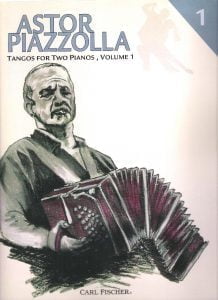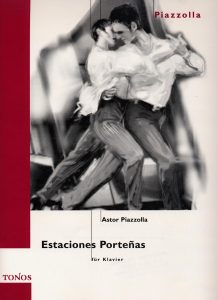Browse in the Library:
Libertango (Piano Solo) – Astor Piazzolla with sheet music (partitura)

Libertango is a composition by tango composer Astor Piazzolla, recorded and published in 1974 in Milan. The title is a portmanteau merging “Libertad” (Spanish for “liberty”) and “tango”, symbolizing Piazzolla’s break from classical tango to tango nuevo.
Astor Piazzolla recorded and published Libertango in 1974 in Milan, symbolizing his break from classical tango to tango nuevo (see below for recording details).
Browse in the Library:
Cellist YoYo Ma played Libertango on his 1997 album Soul of the Tango: The Music of Astor Piazzolla.
It was featured by guitarist Al Di Meola in his 2000 album The Grande Passion.
In 2002 Libertango appeared on Australian/British classical crossover string quartet Bond second album “Shine”.
In 2017, it appeared on the collaborative live album by the Japanese jazz pianist Hiromi and the Colombian harpist Edmar Castaneda, recorded in Montreal.
Although Libertango was born as an instrumental piece, in 1990 Uruguayan poet Horacio Ferrer added lyrics in Spanish language based on the theme of freedom.
According to the performance database at All Music Guide, the composition has appeared on over 500 separate releases. Grace Jones’s song I’ve Seen That Face Before (Libertango) uses the same music, as does Jazz Mandolin Project’s song “Jungle Tango”, Guy Marchand’s song “Moi je suis tango” and Kati Kovács’s song Hívlak.
In 1997 Irish folk musician Sharon Shannon recorded a cover of Grace Jones’ I’ve Seen That Face Before (Libertango) for her third album, Each Little Thing. Featuring session vocals by Kirsty MacColl it also appeared in 2001 on The One and Only, a compilation album released after her death. Shannon re-released the recording as the title track of her 2005 compilation.
Cuban-American singer/composer Luisa Maria Güell added lyrics in the theme of the “Libertango” title and recorded it for her 2007 album Una. A more recent version in Spanish of Libertango lyrics belongs to the Argentinian singer, lyricist and composer Lilí Gardés, who describes the loneliness of city life. This version was approved by Edizione Cursi/Pagani SRL, and it was part of the show Zombitango.
In the Prince of Tennis anime series, Atobe Keigo and Sanada Genichirou attended a performance of this song. They used it later to set the beat for their Doubles match. In the fandom these characters are known as the “Tango Pair”.
Libertango was the backing music in the Tarot advert for Volvo’s S60 compact executive saloon.
The music was used in the Roman Polanski movie Frantic (1988), as well as in Jacques Rivette’s film Le Pont du Nord (1981).
Best Sheet Music download from our Library.
Astor Piazzolla
Astor Pantaleón Piazzolla (March 11, 1921 – July 4, 1992) was an Argentine tango composer, bandoneon player, and arranger. His works revolutionized the traditional tango into a new style termed Nuevo tango, incorporating elements from jazz and classical music. A virtuoso bandoneonist, he regularly performed his own compositions with a variety of ensembles.
In 1992, American music critic Stephen Holden described Piazzolla as “the world’s foremost composer of Tango music”.
After leaving Troilo’s orchestra in the 1940s, Piazzolla led numerous ensembles beginning with the 1946 Orchestra, the 1955 Octeto Buenos Aires, the 1960 “First Quintet”, the 1971 Conjunto 9 (“Noneto”), the 1978 “Second Quintet” and the 1989 New Tango Sextet. As well as providing original compositions and arrangements, he was the director and bandoneon player in all of them.
He also recorded the album Summit (Reunión Cumbre) with jazz baritone saxophonist Gerry Mulligan. His numerous compositions include orchestral work such as the Concierto para bandoneón, orquesta, cuerdas y percusión, Doble concierto para bandoneón y guitarra, Tres tangos sinfónicos and Concierto de Nácar para 9 tanguistas y orquesta, pieces for the solo classical guitar – the Cinco Piezas (1980), as well as song-form compositions that still today are well known by the general public in his country, including “Balada para un loco” (Ballad for a madman) and Adiós Nonino (dedicated to his father), which he recorded many times with different musicians and ensembles. Biographers estimate that Piazzolla wrote around 3,000 pieces and recorded around 500.
In 1984 he appeared with his Quinteto Tango Nuevo in West-Berlin, Germany and for television in Utrecht, Netherlands. In the summer of 1985 he performed at the Almeida Theatre in London for a week-long engagement. On September 6, 1987, his quintet gave a concert in New York’s Central Park, which was recorded and, in 1994, released in compact disc format as The Central Park Concert.


2 responses to “Libertango (Piano Solo) – Astor Piazzolla”